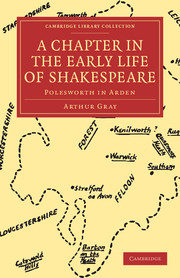Book contents
- Frontmatter
- Contents
- ILLUSTRATIONS
- SECTION 1 The Problem stated
- SECTION 2 The Marlowe fiction
- SECTION 3 The Greenwood theory
- SECTION 4 The Stratford legend
- SECTION 5 Does Shakespeare rail?
- SECTION 6 William Shakespeare, gentleman
- SECTION 7 Concerning Genius
- SECTION 8 Stratford fact and fable
- SECTION 9 The flight to London
- SECTION 10 Shakespeare's silence about Stratford
- SECTION 11 Concerning Arden
- SECTION 12 Of Poets, Patrons and Pages
- SECTION 13 What happened in 1572
- SECTION 14 Polesworth
- SECTION 15 Shakespeare in North Warwickshire
- SECTION 16 Shakespeare's road to London
- SECTION 17 Michael Drayton
- SECTION 18 The Polesworth circle
- SECTION 19 The Gooderes
- SECTION 20 The Sonnets
- SECTION 21 Southampton
- SECTION 22 Warwickshire scenes in Shakespeare's youth
- SECTION 23 The last days
- Plate section
SECTION 12 - Of Poets, Patrons and Pages
Published online by Cambridge University Press: 07 September 2010
- Frontmatter
- Contents
- ILLUSTRATIONS
- SECTION 1 The Problem stated
- SECTION 2 The Marlowe fiction
- SECTION 3 The Greenwood theory
- SECTION 4 The Stratford legend
- SECTION 5 Does Shakespeare rail?
- SECTION 6 William Shakespeare, gentleman
- SECTION 7 Concerning Genius
- SECTION 8 Stratford fact and fable
- SECTION 9 The flight to London
- SECTION 10 Shakespeare's silence about Stratford
- SECTION 11 Concerning Arden
- SECTION 12 Of Poets, Patrons and Pages
- SECTION 13 What happened in 1572
- SECTION 14 Polesworth
- SECTION 15 Shakespeare in North Warwickshire
- SECTION 16 Shakespeare's road to London
- SECTION 17 Michael Drayton
- SECTION 18 The Polesworth circle
- SECTION 19 The Gooderes
- SECTION 20 The Sonnets
- SECTION 21 Southampton
- SECTION 22 Warwickshire scenes in Shakespeare's youth
- SECTION 23 The last days
- Plate section
Summary
Let us concede to Tradition all, and more than all, that it asks for. Let us assume that Stratford school provided an education as good as the best that was given in any provincial school, and that Shakespeare profited by a schooling extending over some ten years and ending, not at thirteen, but at the less usual age of sixteen. Let us assume that the stories of his apprenticeship to a trade are idle talk: that his parents had ‘eaten paper’ and ‘drunk ink,’ contrary to all evidence: that a high degree of culture prevailed in the society of the little town. Let us grant all this: and then let us ask what is the likelihood that in the latter half of the sixteenth century a provincial youth, son of a penniless father, educated solely at a country school, and lacking assistance from friends or patrons, would, at the age of twenty-nine, leap into the foremost place among poets of a time of first-class poetry, and emerge under the distinguished patronage of one of the greatest peers in England.
I take from the Index to Professor Saintsbury's Elizabethan Literature the names of all authors bred in England and born in the half-century 1550–1599, sixty-eight in all. They are of all classes in life and of all branches of authorship: some of them are very minor lights.
- Type
- Chapter
- Information
- A Chapter in the Early Life of ShakespearePolesworth in Arden, pp. 53 - 60Publisher: Cambridge University PressPrint publication year: 2009First published in: 1926

